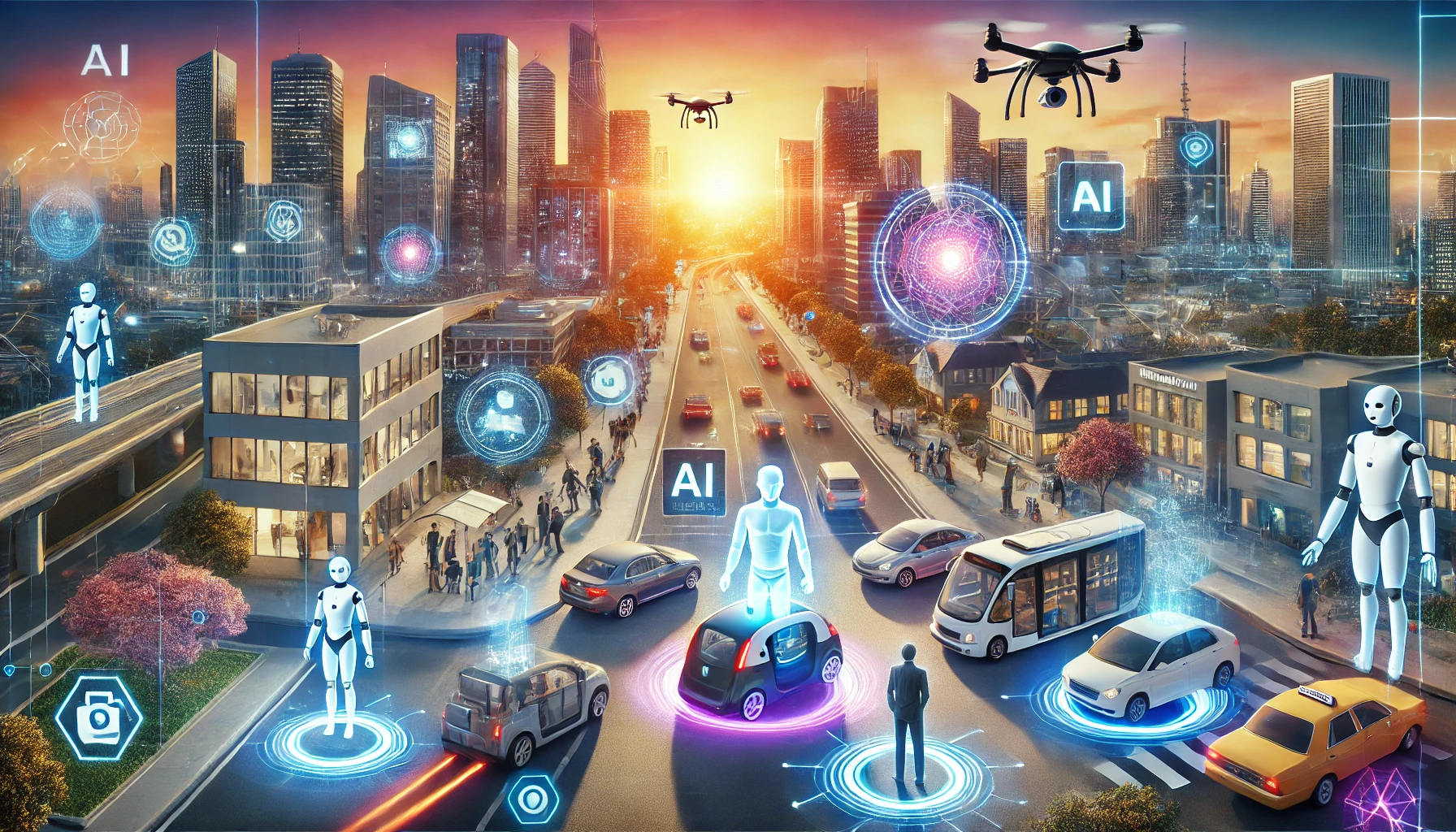“How Artificial Intelligence is Revolutionizing Everyday Life”
Introduction
Artificial Intelligence (AI) is making a huge influence in 2025. It’s not just a slogan anymore; it’s a real game-changer in our daily lives and work. So, why is AI so important? What are the benefits of artificial intelligence that make it so valuable? Let’s explore the top advantages of artificial intelligence and see how they’re reshaping our world.
What is artificial intelligence?
Artificial intelligence refers to technology that permits machines to think and study like humans. It includes everything from simple algorithms to complex systems that can evaluate and understand data. Over the years, AI has developed from a science fiction idea into a practical tool used in many areas of our lives.
Why is AI Important Today?
AI is becoming essential in many fields. Its benefits of artificial intelligence are visible in almost every industry. From healthcare to finance, AI is helping us work more efficiently and make better decisions. As technology advances, the advantages of artificial intelligence continue to grow, making it a crucial part of modern life.
Alan Turing British mathematician Alan Turing, c. 1930s. Turing did the earliest work on AI, and he introduced many of the central concepts of AI in a report entitled “Intelligent Machinery” (1948).
history of artificial intelligence (AI), a survey of important events and people in the field of artificial intelligence (AI) from the early work of British logician Alan Turing in the 1930s to advancements at the turn of the 21st century. AI is the ability of a digital computer or computer-controlled robot to perform tasks commonly associated with intelligent beings. The term is frequently applied to the project of developing systems endowed with the intellectual processes characteristic of humans, such as the ability to reason, discover meaning, generalize, or learn from past experience. For modern developments in AI, see artificial intelligence.
Alan Turing and the Beginning of AI
Theoretical work
The earliest substantial work in the field of artificial intelligence was done in the mid-20th century by the British logician and computer pioneer Alan Mathison Turing. In 1935, Turing described an abstract computing machine consisting of a limitless memory and a scanner that moves back and forth through the memory, symbol by symbol, reading what it finds and writing further symbols. The actions of the scanner are dictated by a program of instructions that also is stored in the memory in the form of symbols. This is Turing’s stored-program concept, and implicit in it is the possibility of the m
achine operating on, and so modifying or improving, its own program. Turing’s conception is now known simply as the universal Turing machine. All modern computers are, in essence, universal Turing machines.
Artificial Intelligence (AI) works by analyzing large amounts of data using algorithms to identify patterns and relationships, allowing machines to learn from experience and perform tasks that typically require human intelligence, like learning, reasoning, and decision-making, through a process of continuous adaptation and improvement based on the data they are exposed to; essentially, AI simulates human intelligence by processing information and making predictions based on the patterns it finds in data.
Key aspects of how AI functions:
Data:
AI relies heavily on large datasets to train its algorithms and learn from patterns within the information.
Algorithms:
These are sets of instructions that guide the AI’s analysis and decision-making process, allowing it to identify relevant features and make predictions based on the data.
Machine Learning:
A common approach where AI systems learn from data without explicit programming, improving their performance over time through feedback and experience.
How AI learns:
Training Phase: AI systems are initially trained on large datasets, where they are exposed to examples and labeled data to learn specific patterns and relationships.
Evaluation: The AI’s performance is evaluated on new data to assess its accuracy and identify areas for improvement.
Key benefits and applications of AI
AI can reduce human errors, especially decisions where emotions or personal opinions or biases could affect the accuracy of the decision.
Few Benefits of Artificial Intelligence in 2025
Here’s a look at the top few benefits of artificial intelligence in 2025:
- Enhanced Data Analysis and Insights
AI excels at processing and analyzing large volumes of data quickly. Traditional data analysis methods can be time-consuming and prone to human error. AI, however, can sift through enormous datasets to identify patterns and trends that might be missed by human analysts. This ability to deliver precise and actionable insights is a major advantage of artificial intelligence. For example, businesses use AI to analyze customer behavior, forecast market trends, and tailor their strategies to meet customer needs more effectively.
- Improved Healthcare Services
AI is revolutionizing the healthcare industry by improving diagnostic accuracy and treatment effectiveness. Machine learning algorithms can analyze medical images, such as MRIs and CT scans, to detect abnormalities that might be missed by human radiologists. Additionally, AI-powered systems can recommend personalized treatment plans based on a patient’s unique medical history and genetic profile. These advancements lead to earlier diagnoses, more accurate treatments, and better patient outcomes, highlighting a significant benefit of artificial intelligence in healthcare.
- Better Decision-Making Capabilities
AI enhances decision-making processes by providing real-time data analysis and insights. For businesses, this means having access to accurate, up-to-date information that can inform strategic decisions. AI systems can analyze historical data, predict future trends, and suggest the best courses of action. This capability helps organizations make informed choices quickly, adapting to changes in the market or operational conditions. The ability to leverage AI for decision-making is a key advantage of artificial intelligence.
Examples of AI applications in today’s world:
- Healthcare: AI-assisted diagnosis, drug discovery, personalized treatment plans
- Finance: Fraud detection, algorithmic trading, risk assessment
- Retail: Product recommendations, customer service chatbots
- Transportation: Self-driving cars, traffic optimization
- Manufacturing: Quality control, predictive maintenance
- Job displacement: Automation could lead to job losses in certain sectors.
LIMITATIONS OF AI
Artificial intelligence (AI) has several limitations, including bias, lack of creativity, and privacy concerns.
Are There Any Ethical Concerns in AI?
Bias and Fairness in AI:
One of the primary ethical challenges of AI in 2025 is the issue of bias and fairness. AI systems, like any other technology, are created by humans and can inherit human biases. These biases can have profound implications for staffing and human capital. When AI is involved in the recruitment process, for instance, it can inadvertently perpetuate discriminatory practices, leading to unfair hiring decisions.
Creativity
Lack of originality: AI can generate content, but it struggles with creativity and original thought.
Privacy and Data Security:
Another pressing concern in the realm of ethical AI is the preservation of privacy and data security. In the staffing and human capital context, AI often relies on vast amounts of personal data to make informed decisions about job candidates or employee performance. However, the mishandling of this data can have serious consequences.
For instance, if AI systems are not adequately protected against cyberattacks or data breaches, sensitive information about employees or potential hires could be exposed, leading to severe privacy violations. Moreover, the misuse of personal data collected by AI can erode trust within the workforce and damage an organization’s reputation.
FUTURE PROSPECTS OF AI
Artificial intelligence (AI) will continue to evolve in the future, becoming more integrated into our lives. AI will be used in more industries, including healthcare, education, finance, and transportation.
Military and Cybersecurity
- AI will help develop autonomous weapon systems and robots.
- AI will help strengthen cybersecurity through threat analysis and prevention systems.
Advertising
- AI will help create personalized ads based on users’ interests, behaviors, and locations.
Other areas
- AI will help automate routine tasks across industries.
- AI will help improve patient care.
- AI will help predict and prevent diseases.
Evolution of AI
Today AI has countless innovators; for example, in 2021 IBM inventors received 9,130 patents, out of which 2,300 were AI-related. Tech titan and now Twitter’s god Elon Musk donated $10 million to OpenAI, a non-profit research company.
The evolutionary period of technology begins with “knowledge engineering,” when technology began to incline towards model-and-algorithm-based machine learning and increasingly shifted its focus on perception, reasoning, and generalization. Now AI has become the center of the world, and it won’t cede the spotlight anytime soon.
What to Expect From AI in the Next 5 – 10 Years
Gone are the days when artificial intelligence used to be a buzzword; now, AI has achieved an inflection point and is on its way to transforming every industry. As per the speculations, AI will steal many jobs from the market, and in the future it will play an important role in shaping the future of humanity in every industry.
CONCLUSION
The benefits of artificial intelligence in 2025 are extensive and transformative. From improving healthcare and customer service to enhancing productivity and environmental conservation, AI is playing a crucial role in various fields. The advantages of artificial intelligence are driving innovation and helping us solve complex problems more effectively. As AI technology continues to advance, its impact on our lives and industries will only grow, offering exciting possibilities for the future. I urge you all to stay tuned and watch out for the great works AI holds for us all in the future. future. With ongoing research and development, we can expect AI to not only improve efficiency but also foster creativity and collaboration across different sectors. This transformative technology has the potential to reshape how we approach challenges and create solutions that benefit society as a whole.
Blog Written by:
Joseph Benjamin Owoicho
Intern at Cognifyz Technologies
Lagos, Nigeria.








